Alabama politicians, groups react to Supreme Court decision on Donald Trump’s travel ban
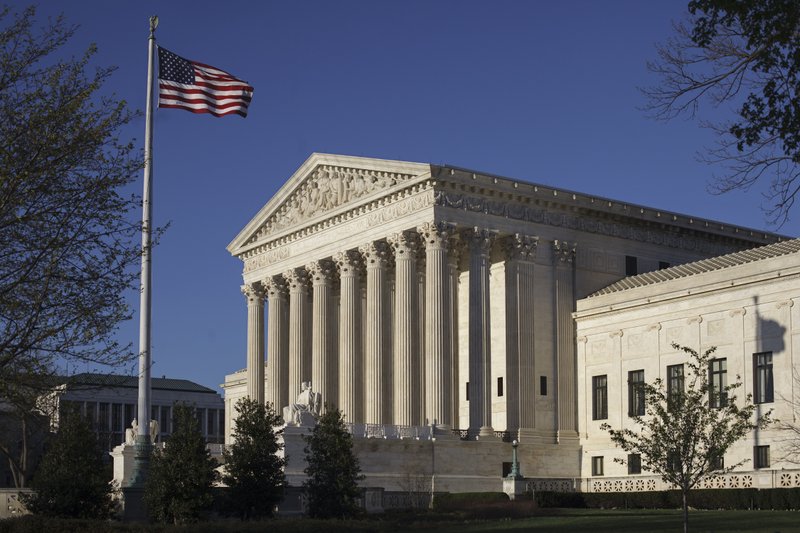
The Supreme Court of the United States ruled in favor of the Trump Administration’s travel ban, which prohibits travel from seven countries: Libya, Syria, North Korea, Iran, Somalia, Yemen and Venezuela. In a 5-4 decision, the court reversed an injunction that had — until December 2017 — prevented the Trump administration from using the Travel Ban 3.0 as a basis for denying visas to foreign nationals from the affected countries. Here are their reactions (in order received/seen online): Terry Lathan | Chairman of the Alabama Republican Party (ALGOP) The Constitution has clearly given a president the authority to implement executive orders. The travel ban pertaining to several countries was in that scope. This is not a policy on discrimination- it is a policy on the security of our nation. Chief Justice John Roberts was correct when he authored that the ruling was ‘squarely within the scope of presidential authority’ under our federal laws. We applaud the Supreme Court’s decision on this matter. Alabama 3rd District U.S. Rep. Mike Rogers: I was thrilled today to see the Supreme Court uphold President Trump’s travel ban. It is a huge win for the safety of the American people and our national security. President Trump is exactly right that we must fully vet people from these countries before even considering to allow them into the United States. Keeping Americans safe is one of the highest duties of the government and this was absolutely the right decision. Alabama 5th District U.S. Rep. Mo Brooks: I applaud the Supreme Court for finding that President Trump has authority to take such actions as are necessary to protect American lives from terrorism risks. America is safer as a result. The President’s legal authority on immigration and national security in this instance is clear. The liberal, judicially activist 9th Circuit, the most error-prone and reversed circuit court of appeal, unnecessarily put American lives at risk when it undermined the President’s Constitutional authority to protect Americans. I am pleased the Supreme Court overturned the 9th Circuit’s liberal, activist, and unconstitutional overreach. I fully supported President Trump when he issued the Travel Order Proclamation and I fully support the President’s continued actions to protect American lives. Today’s decision is a win for the Rule of Law. Alabama 7th District U.S. Rep. Terri Sewell: Today’s Supreme Court ruling upholding the Muslim travel ban takes our country in the wrong direction. America was built on the promise of freedom and opportunity for immigrants of all backgrounds, regardless of religion. Trump’s own statements on the purpose of his Muslim ban are evidence of the religious discrimination that his Muslim ban is founded on. While the President has authority to protect our national security, promoting blatant religious discrimination only undermines our interests abroad and our security at home. Trump’s Muslim ban does not make our country safer. Instead, it weakens our fight against terror by handing extremists a tool for recruitment and alienating Muslim partners around the globe. Additionally, the ban robs our nation of the economic input of immigrants, who are business owners, community leaders, students, and workers in our communities. Policies that discourage foreign investments in and partnerships with our country should be rejected by all who care about the long-term standing of the United States as a global leader. It is time for this Congress to hold the Trump Administration accountable for its dangerous, anti-family, anti-immigrant policies. CAIR-Alabama | Executive Director Khaula Hadeed Today’s decision deeply impacts Muslim communities and communities of color. This is not the first time the Court has been wrong on a decision. In Korematsu the Court permitted the incarceration of thousands of people based on their Japanese ancestry. In this case, Trump set out to ban Muslims from entering the country and the Court permitted him to do so. This decision empowers the president and future administrations to discriminate on the basis of religion. Randall Woodfin | Mayor of Birmingham America was founded by immigrants. It was built by immigrants. Yet the Supreme Court’s travel ban ruling undermines an entire group of people based on their religious beliefs. This is not who we are. America was built on the idea that people from all walks of life could come together and live in harmony. President Trump’s statements over the past few years demonstrate purposeful intent to deny our Muslim brothers and sisters the rights enjoyed by everyone within our borders. Birmingham taught the world the meaning of equality and tolerance. This is not it.
Supreme Court permits full enforcement of Donald Trump travel ban
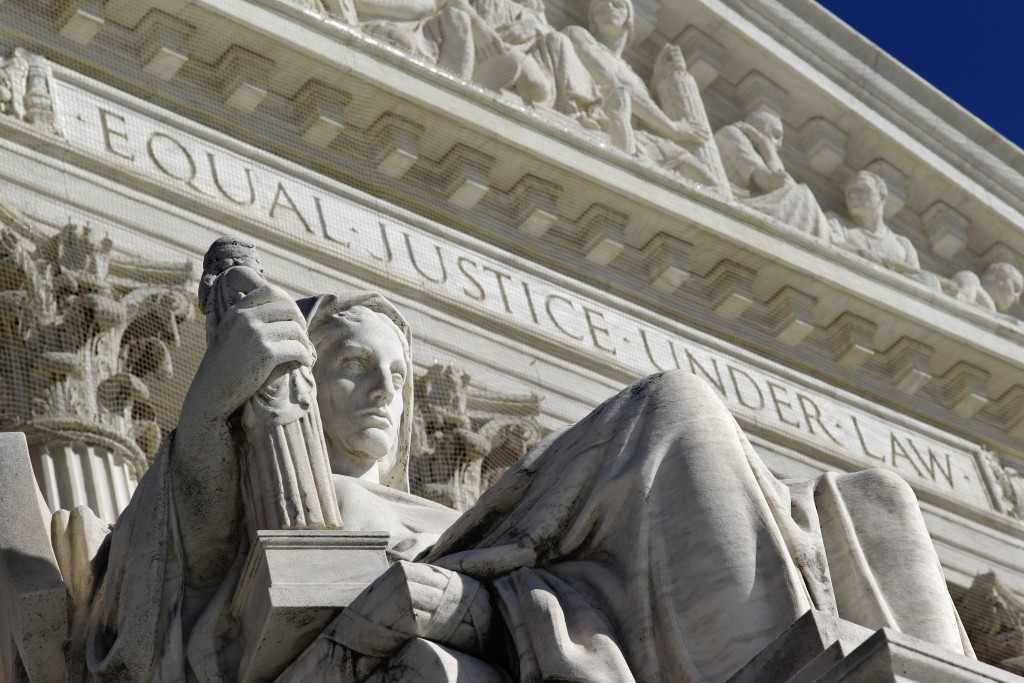
The US Supreme Court on Monday issued an order permitting full enforcement of President Donald Trump’s revised travel ban to go into effect while legal challenges continue to be argued in lower courts. While not a final ruling, the court is allowing the Trump administration enforce a ban on travel to the U.S. by residents of six mostly Muslim countries — Syria, Chad, Iran, Libya, Somalia and Yemen. The only dissent from the court came from Justices Ruth Bader Ginsburg and Sonia Sotomayor who would have left the lower court order in place had they not had the minority opinion on the court. White House Deputy Press Secretary Hogan Gidley responded to the court’s decision and called the ban “lawful and essential to protecting our homeland.” “We look forward to presenting a fuller defense of the proclamation as the pending cases work their way through the courts,” Gidley added. What happens next? Federal appeals courts in San Francisco, California, and Richmond, Virginia, will hear arguments this week on whether the Trump’s third executive order of the travel ban policy is lawful. The Supreme Court noted it expects those lower courts to reach decisions “with appropriate dispatch.” Meaning the case will eventually end up back in the Supreme Court, likely by the end of June.
Strike 3 for Donald Trump’s latest travel ban, judge says it has same woes
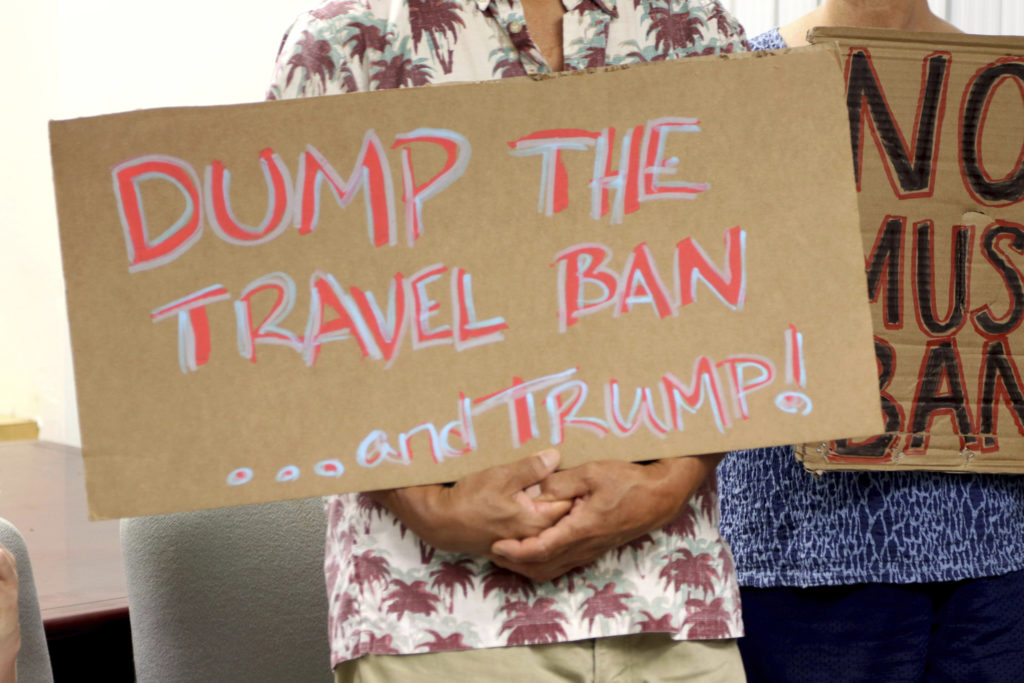
A federal judge in Hawaii blocked most of President Donald Trump‘s latest travel ban Tuesday, just hours before it was set to take effect, saying the revised order “suffers from precisely the same maladies as its predecessor.” It was the third set of travel restrictions issued by President Donald Trump to be thwarted, in whole or in part, by the courts. U.S. District Judge Derrick Watson issued the ruling after the ban on a set of mostly Muslim countries was challenged by the state of Hawaii, which warned that the restrictions would separate families and undermine the recruiting of diverse college students. White House spokeswoman Sarah Huckabee Sanders called the ruling “dangerously flawed” and said it “undercuts the president’s efforts to keep the American people safe.” The Justice Department said it will quickly appeal. At issue was a ban, announced in September and set to go into effect early Wednesday, on travelers from Chad, Iran, Libya, North Korea, Somalia, Syria and Yemen, along with some Venezuelan government officials and their families. The Trump administration said the ban was based on an assessment of each country’s security situation and willingness to share information with the U.S. Watson, appointed to the bench by President Barack Obama, said the new restrictions ignore a federal appeals court ruling against Trump’s previous ban. The latest version “plainly discriminates based on nationality in the manner that the 9th Circuit has found antithetical to … the founding principles of this nation,” Watson wrote. The judge’s ruling applies only to the six Muslim-majority countries on the list. It does not affect the restrictions against North Korea or Venezuela, because the state of Hawaii did not ask for that. “This is the third time Hawaii has gone to court to stop President Trump from issuing a travel ban that discriminates against people based on their nation of origin or religion,” Hawaii Attorney General Doug Chin said in a statement. “Today is another victory for the rule of law.” Hawaii argued the updated ban was a continuation of Trump’s campaign call for a ban on Muslims, despite the addition to the list of two countries without a Muslim majority. In his ruling, the judge said the new ban, like its predecessor, fails to show that nationality alone makes a person a greater security risk to the U.S. “The categorical restrictions on entire populations of men, women and children, based upon nationality, are a poor fit for the issues regarding the sharing of ‘public-safety and terrorism-related information’ that the president identifies,” Watson said. He also said the ban in inconsistent in the way some countries are included or left out. For example, Iraq failed to meet the security benchmark but was omitted from the ban. Somalia met the information-sharing benchmark but was included. Watson also found fault with what sorts of visitors are barred. For instance, all tourists and business travelers from Libya are excluded from the U.S., but student visitors were allowed. The judge said he would set an expedited hearing to determine whether his temporary restraining order blocking the ban should be extended. Other courts are weighing challenges to the ban. In Maryland, the American Civil Liberties Union and other groups are seeking to block the visa and entry restrictions. Washington state, Massachusetts, California, Oregon, New York and Maryland are challenging the order in front of the same federal judge in Seattle who struck down Trump’s initial ban in January. That ban – aimed mostly at Muslim-majority countries – led to chaos and confusion at airports nationwide and triggered several lawsuits, including one from Hawaii. When Trump revised the ban, Hawaii challenged that version, too, and Watson agreed it discriminated on the basis of nationality and religion. A subsequent U.S. Supreme Court ruling allowed the administration to partially reinstate restrictions against Iran, Libya, Somalia, Sudan, Syria and Yemen and against all refugees. Hawaii then successfully challenged the government’s definition of which relatives of people already living in the U.S. would be allowed into the country, and Watson ordered the list expanded. Republished with permission from the Associated Press.
Donald Trump replaces 90-day ban with new travel restrictions
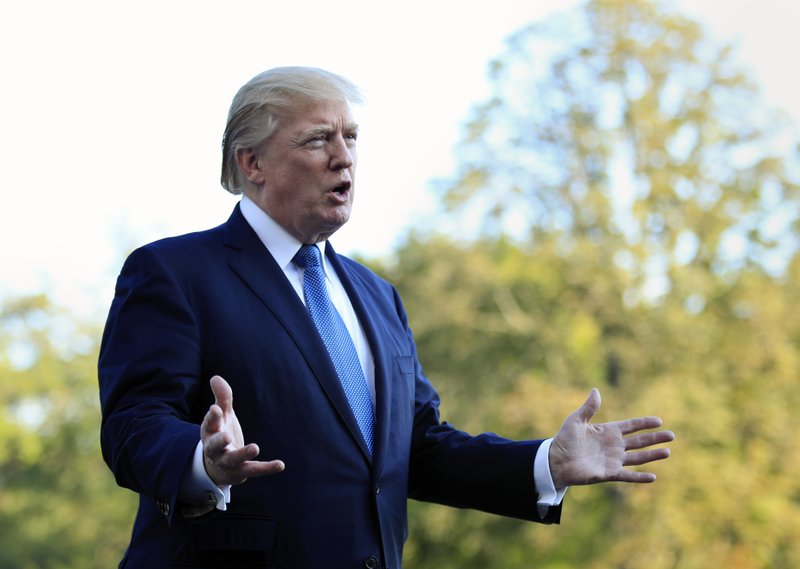
President Donald Trump has signed a proclamation imposing strict new restrictions on travelers from a handful of countries, including five that were covered by his expiring travel ban. Administration officials say the new measures are required to keep the nation safe. The indefinite restrictions apply to citizens of Chad, Iran, Libya, Somalia, Syria, Yemen and North Korea. As part of the presidential proclamation signed Sunday, the U.S. will also bar the entry of certain Venezuelan government officials and their immediate families. The changes will take effect October 18. The announcement came the same day that Trump’s temporary ban on visitors from six Muslim-majority countries was set to expire, 90 days after it went into effect. That ban had barred citizens of Iran, Libya, Somalia, Sudan, Syria and Yemen who lacked a “credible claim of a bona fide relationship with a person or entity in the United States” from entering the U.S. Only one of those countries, Sudan, will no longer be subject to travel restrictions. “Making America Safe is my number one priority. We will not admit those into our country we cannot safely vet,” Trump tweeted late Sunday after the new policy was announced. Unlike the first iteration of Trump’s travel ban, which sparked chaos at airports across the country and a flurry of legal challenges after being hastily written with little input outside the White House, officials stressed they had been working for months on the new rules, in collaboration with various agencies and in conversation with foreign governments. To limit confusion, valid visas would not be revoked as a result of the proclamation. The order also permits, but does not guarantee, case-by-case waivers for citizens of the affected countries. The restrictions are targeted at countries that the Department of Homeland Security says fail to share sufficient information with the U.S. or haven’t taken necessary security precautions. DHS has spent recent months working to develop a new security baseline, which includes factors such as whether countries issue electronic passports with biometric information, report lost or stolen passports to INTERPOL, an international law enforcement body, and share information about travelers’ terror-related and criminal histories. Citizens of countries that don’t meet the standard will face restrictions until they make changes to bring them into compliance. The new rules include the suspension of all immigrant visas for nationals of Chad, Iran, Libya, North Korea, Syria, Yemen and Somalia, and the suspension of non-immigrant visas, such as for business and tourism, to nationals of Chad, Libya, North Korea, Syria and Yemen. Citizens of Iran will not be eligible for tourism and business visas, but remain eligible for student and cultural exchange visas if they undergo additional scrutiny. Such additional scrutiny will also be required for Somali citizens applying for all non-immigrant visas. Critics have accused Trump of overstepping his legal authority and violating the U.S. Constitution’s protections against religious bias each time he has ordered new travel restrictions. And the inclusion of Venezuela and North Korea appeared to be an attempt to block challenges from advocacy groups and others who have called the restrictions a ban on Muslims. Trump during his campaign called for a “total and complete shutdown of Muslims entering the United States.” The U.S. had already imposed wide-ranging sanctions on certain high-ranking Venezuelan government officials to protest the government’s attempts to consolidate power. “The fact that Trump has added North Korea — with few visitors to the U.S. — and a few government officials from Venezuela doesn’t obfuscate the real fact that the administration’s order is still a Muslim ban,” said Anthony D. Romero, executive director of the American Civil Liberties Union, which has been challenging the ban in court. “President Trump’s original sin of targeting Muslims cannot be cured by throwing other countries onto his enemies list.” But administration officials argue the measure is necessary to keep Americans safe. Republished with permission from the Associated Press.
Donald Trump: London bombing is reason to expand US travel ban
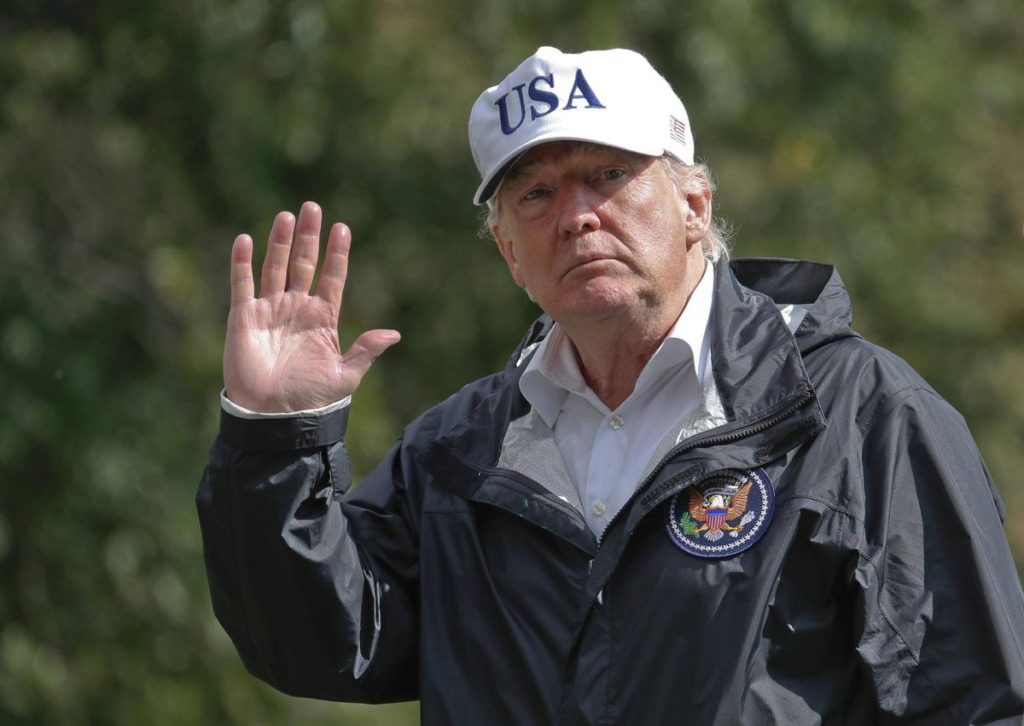
President Donald Trump called Friday for a “tougher and more specific” U.S. travel ban after a homemade bomb exploded on a London train. In a flurry of early-morning tweets, Trump called the explosion another attack “by a loser terrorist” and suggested London police missed an opportunity to prevent it. He added that his travel ban targeting six mostly Muslim nations should be “far larger, tougher and more specific – but stupidly, that would not be politically correct!” The bomb exploded on a packed train during rush hour on Friday, leaving at least 22 people injured but no one seriously hurt. Police said the explosion was a terrorist attack, the fifth in Britain this year. “Another attack in London by a loser terrorist,” Trump tweeted. “These are sick and demented people who were in the sights of Scotland Yard. Must be proactive!” Scotland Yard declined comment, but British Prime Minister Theresa May quickly responded, saying: “I never think it’s helpful for anybody to speculate on what is an ongoing investigation.” Trump told reporters Friday morning that he had been briefed on the explosion and said he planned to call May. Asked about his tweet on the travel ban, Trump said “we have to be tougher and we have to be smarter.” Trump’s tough talk came a day after he drew conservative criticism for pursuing an agreement with Democrats on young immigrants who had been living in the country illegally. Trump said Thursday he was “fairly close” to an agreement that could protect these so-called “dreamers” while also adding border security, as long as his wall with Mexico would be separately addressed. The president has repeatedly criticized London Mayor Sadiq Khan, the British capital’s first Muslim leader. In June, after attacks in the London Bridge area that claimed seven lives, Khan warned locals not to be alarmed by the large presence of armed officers on the capital’s streets. Trump accused the mayor on Twitter of suggesting there was “no reason to be alarmed” by the attack itself. On Friday, Trump again jumped into the fray, promoting his handling of extremist militants and saying the government should cut of the internet to such groups. “Loser terrorists must be dealt with in a much tougher manner. The internet is their main recruitment tool which we must cut off & use better!” And he argued that his administration has “made more progress in the last nine months against ISIS than the Obama Administration has made in 8 years.” Trump concluded: “Must be proactive & nasty!” Trump’s travel ban has been ensnared in the courts since Trump’s first attempt to enact the policy in January. The Supreme Court is scheduled to hear arguments on Oct. 10 on the legality of the bans on travelers from six mostly Muslim countries and refugees anywhere in the world. It’s unclear, though, what will be left for the court to decide. The 90-day travel ban on visitors from Iran, Libya, Somalia, Sudan, Syria and Yemen lapses in late September, and the 120-day refugee ban will expire a month later. The administration has yet to say whether it will seek to renew the bans, make them permanent or expand the travel ban to other countries. Republished with permission from the Associated Press.
Appeals court rules Donald Trump’s travel ban doesn’t include grandparents, other extended family
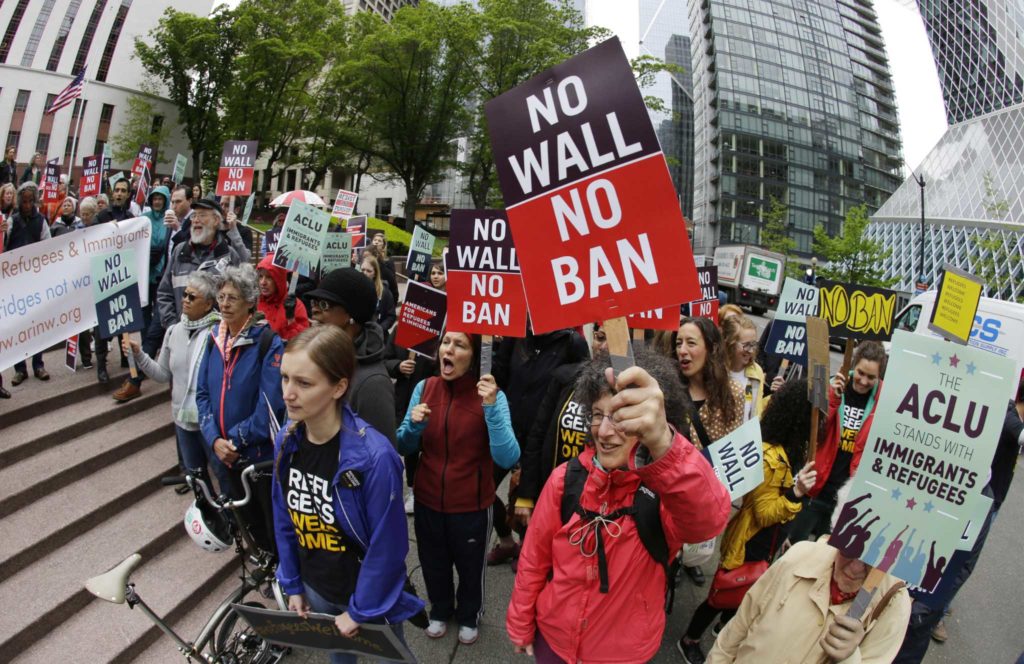
Grandparents, cousins and similarly close relations of people in the United States should not be prevented from coming to the country under President Donald Trump‘s travel ban, a federal appeals court has ruled in another legal defeat for the administration on the contentious issue. The decision Thursday from three judges on the 9th U.S. Circuit Court of Appeals upheld a ruling by a federal judge in Hawaii, who found the administration’s view of who should be allowed into the country under the ban is too strict. The unanimous ruling also said refugees accepted by a resettlement agency should not be banned. “Stated simply, the government does not offer a persuasive explanation for why a mother-in-law is clearly a bona fide relationship, in the Supreme Court’s prior reasoning, but a grandparent, grandchild, aunt, uncle, niece, nephew, or cousin is not,” the 9th Circuit said. The appeals panel wrote that under typical court rules, its ruling would not take effect for at least 52 days. But in this instance, the judges said, many refugees would be “gravely imperiled” by such a delay, so the decision will take effect in five days. “Refugees’ lives remain in vulnerable limbo during the pendency of the Supreme Court’s stay,” they wrote. “Refugees have only a narrow window of time to complete their travel, as certain security and medical checks expire and must then be reinitiated.” The Justice Department said it would appeal. “The Supreme Court has stepped in to correct these lower courts before, and we will now return to the Supreme Court to vindicate the executive branch’s duty to protect the nation,” the agency said in a statement. The U.S. Supreme Court said in June that President Donald Trump’s 90-day ban on visitors from Iran, Libya, Somalia, Sudan, Syria and Yemen can be enforced pending arguments scheduled for October, partially overturning lower-court rulings. But the justices said it should not apply to visitors who have a “bona fide relationship” with people or organizations in the U.S., such as close family ties or a job offer. That set the stage for much disagreement over what constitutes a bona fide relationship. The government interpreted such family relations to include immediate family members and in-laws, but not grandparents, cousins, aunts and uncles. The judge in Hawaii overruled that interpretation, expanding the definition of who can enter the country to the other categories of relatives. He also overruled the government’s assertion that refugees from those countries should be banned even if a resettlement agency in the U.S. had agreed to take them in. The administration argued that resettlement agencies have a relationship with the government, not with individual refugees. The appeals court rejected that, saying the Supreme Court was concerned with any harm the travel ban might impose on people or organizations in the U.S. Resettlement agencies have spent time and money securing rental housing, buying furniture and performing other tasks that would be in vain if the refugees were blocked, the 9th Circuit said. They also would lose out on government funding for the resettlement services. Lawyers for the government and the state of Hawaii, which challenged the travel ban, argued the case in Seattle last week. Deputy assistant attorney general Hashim Mooppan ran into tough questions as soon as he began arguing the government’s case, with Judge Ronald Gould asking him from “what universe” the administration took its position that grandparents don’t constitute a close family relationship. Mooppan conceded that people can have a profound connection to their grandparents and other extended relatives, but from a legal perspective, the administration had to draw the line somewhere to have a workable ban based largely on definitions used in other aspects of immigration law, he said. Hawaii is also one of 15 states that sued the Trump administration Wednesday over its plans to end the Deferred Action for Childhood Arrivals program that protects young immigrants from deportation. “Today’s decision by the 9th Circuit keeps families together. It gives vetted refugees a second chance,” state Attorney General Douglas Chin said in a statement. “The Trump administration keeps taking actions with no legal basis. We will keep fighting back.” Republished with permission from the Associated Press.
Alabama joins 15-state coalition in amicus brief supporting Donald Trump’s travel ban
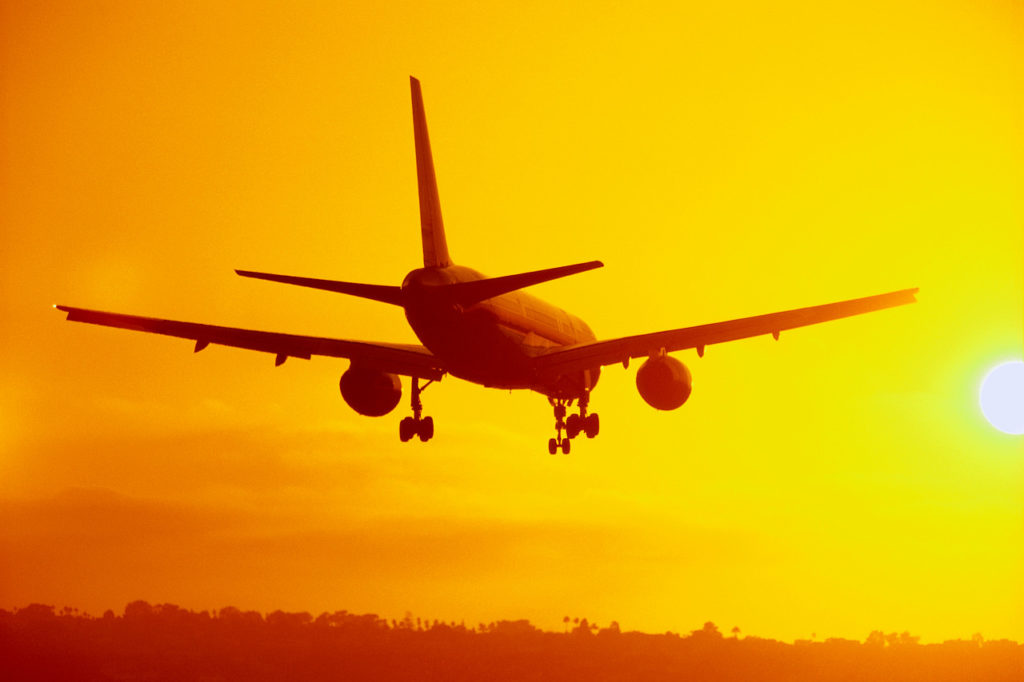
A team of state attorneys general submitted an amicus brief to the U.S. Supreme Court on Thursday in support of the Trump administration’s efforts to restrict travel to the United States by providing a 90-day delay of travelers entering America from Iran, Libya, Somalia, Sudan, Syria and Yemen due to national security concerns regarding those countries. Alabama Attorney General Steve Marshall joined 15 other states in the brief the Court to uphold the travel ban to protect American citizens from terrorism. “The President is rightfully exercising his legal authority to restrict the entry of those who may endanger the safety and security of Americans,” said Marshall. “The restricted countries have a strong record of violent acts and terrorism, and it is vital and appropriate that the President’s provisions stand to properly vet travelers from these areas for the protection of our citizens.” The brief relates to an executive order Trump signed March 6, a revision to an earlier travel ban he signed January 27, a week into his presidency. Federal judges subsequently prevented both versions from being fully implemented, dealing a major legal setback to the new administration’s immigration policy. The Trump administration appealed the injunctions to the Supreme Court, which allowed a limited version of the ban to take effect and will hear full arguments in October. Thursday’s amicus brief was filed by the State of Texas and joined by Alabama, Arizona, Arkansas, Florida, Kansas, Louisiana, Missouri, North Dakota, Ohio, Oklahoma, South Carolina, South Dakota, Tennessee, and West Virginia, along with Gov. Phil Bryant of Mississippi.
Judge expands list of relatives exempted from Donald Trump’s travel ban
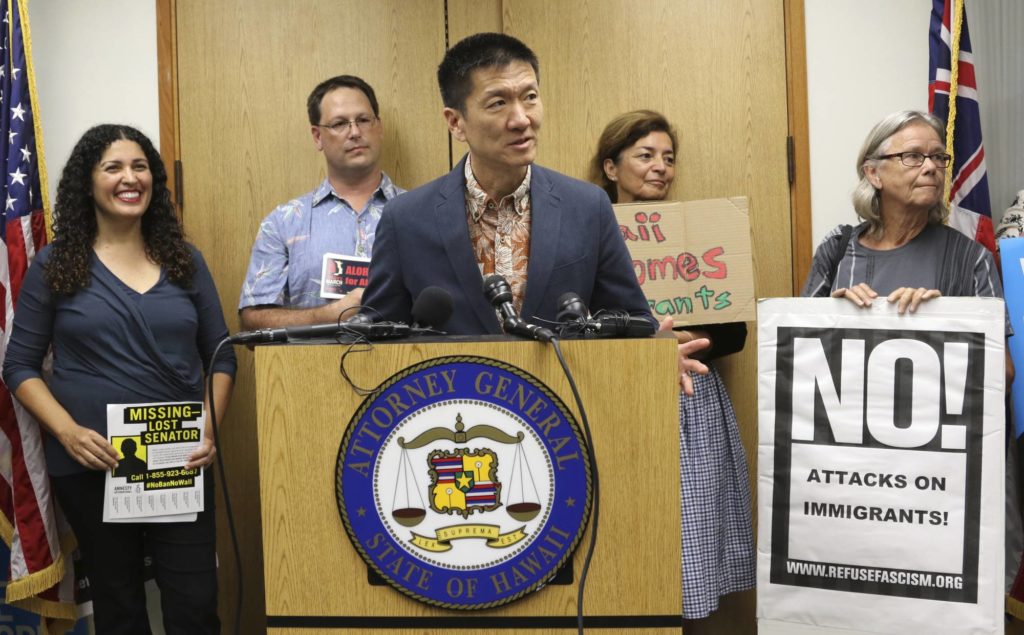
In another setback for President Donald Trump, a federal judge in Hawaii has further weakened his already diluted travel ban by vastly expanding the list of family relationships with U.S. citizens that visa applicants can use to get into the U.S. The ruling is the latest piece of pushback in the fierce fight set off by the ban Trump first attempted in January. It will culminate with arguments in front of the U.S. Supreme Court in October. The current rules aren’t so much an outright ban as a tightening of already-tough visa policies affecting citizens from six Muslim-majority countries: Syria, Sudan, Somalia, Libya, Iran and Yemen. People from those countries who already have visas will be allowed into the country. Only narrow categories of people, including those with relatives named in Thursday’s ruling, will be considered for new visas. U.S. District Judge Derrick Watson on Thursday ordered the government not to enforce the ban on grandparents, grandchildren, brothers-in-law, sisters-in-law, aunts, uncles, nieces, nephews and cousins of people in the United States. “Common sense, for instance, dictates that close family members be defined to include grandparents,” Watson said in his ruling. “Indeed grandparents are the epitome of close family members.” Watson also ruled that the government may not exclude refugees who have formal assurance and promise of placement services from a resettlement agency in the U.S. The U.S. Supreme Court, which last month allowed a scaled-back version of the ban to go into effect before it hears the case in October, exempted visa applicants from the ban if they can prove a “bona fide” relationship with a U.S. citizen or entity. The Trump administration defined “bona fide” relationship as those who had a parent, spouse, fiance, son, daughter, son-in-law, daughter-in-law or sibling already in the U.S. The case came back to Watson when the 9th U.S. Circuit Court of Appeals ruled that he had the authority to interpret the Supreme Court’s order and block any violation of it. Watson’s Thursday ruling broadened the definition of what counts as a “bona fide” relationship to include grandparents and the rest of the wider list of relatives. Hawaii Attorney General Douglas S. Chin, who represents the state as the plaintiff in the case said the court made clear “that the U.S. government may not ignore the scope of the partial travel ban as it sees fit.” “Family members have been separated and real people have suffered enough,” Chin said in a statement. The Supreme Court ruled that workers who accepted jobs from American companies, students who enrolled at a U.S. university or lecturers invited to address a U.S. audience would also be exempt. A relationship created for purposes of avoiding the travel ban would not be acceptable, the justices said. Trump proposed a blanket ban on Muslims during his campaign, but limited it to a handful of countries when he issued his initial travel ban in January, promoting it as a necessary tool for national security and fighting terrorism. It set off massive protests at airports around the country and immediately sparked a sprawling, ongoing legal fight. Courts blocked that first ban as well as a second the Trump administration had retooled, until the Supreme Court partially reinstated it at the end of June. It’s unclear how significantly the new rules have affected or will affect travel. In most of the countries singled out, few people have the means for leisure travel. Those that do already face intensive screenings before being issued visas. Republished with permission of The Associated Press.
Travel ban was on, then off. Now it’s back, but different
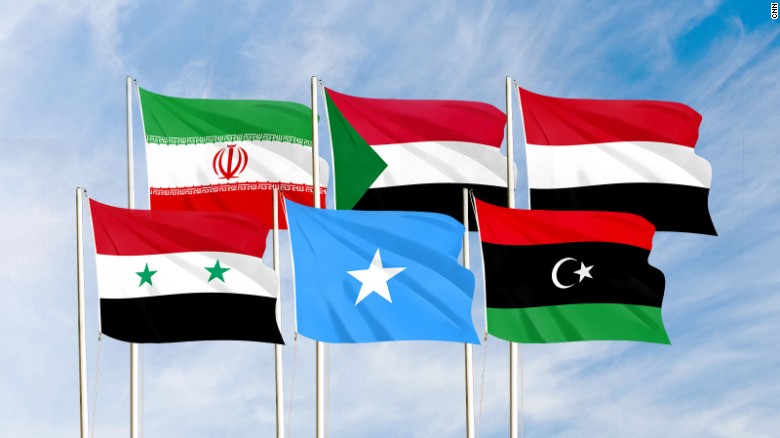
President Donald Trump‘s first, temporary ban on travelers from seven majority-Muslim nations was short-lived, but it sparked confusion, panic and anger that lasted through months of court rulings. The Supreme Court is now taking up the case in the fall. In the meantime, the government can enforce parts of a second version of Trump’s order. So what’s new this time? — BANNED FOREIGNERS Old order: Three-month ban on citizens from seven Muslim-majority countries, including those who had valid visas but were outside the United States when the ban was signed. Supreme Court version: Iraq has been dropped from the ban. For 90 days, the government can bar new visa applicants from Syria, Sudan, Somalia, Yemen, Iran and Libya who can’t prove they have a “bona fide relationship” with close relatives or a business in the United States. The State Department says valid relationships include a parent, spouse, fiancé, child, adult son or daughter, son-in-law, daughter-in-law, sibling already in the United States. Journalists, students, workers or lecturers who have valid, formal invitations or employment contracts in the U.S. will also be welcome. Refugees hoping to come to the United States who aren’t already approved for travel must now also prove one of these relationships. Otherwise, they’ll be barred for 120 days. — SYRIANS Old order: Syrian visitors, immigrants and refugees were barred from the United States indefinitely. Supreme Court version: Syrians will be treated in the same manner as citizens of the other five designated countries. — REFUGEES Old order: Four-month halt to refugees entering the United States. Supreme Court version: The refugee ban will be in place for 120 days. But refugees already vetted and approved for travel through July 6 will be allowed to move to the United States. The “bona fide relationship” standard applies after a cap of 50,000 refugees that Trump set for the fiscal year is met. That is likely to happen soon. The new rules will likely affect refugees in the next fiscal year, which starts in October. The Supreme Court will hold a hearing on the ban that same month. — TIMING Old order: The Jan. 27 order was immediately put into place, causing chaos and panic at airports as the Homeland Security Department scrambled to figure out who was covered by the order and how it was to be implemented. Supreme Court version: It went into effect at roughly 8 p.m. Eastern time Thursday, more than 72 hours after the Supreme Court issued its opinion. Republished with permission of The Associated Press.
Supreme Court ruling in travel ban case leaves many questions

The Supreme Court’s decision to partially reinstate President Donald Trump‘s temporary travel ban has left the effort to keep some foreigners out of the United States in a murky middle ground, with unanswered questions and possibly more litigation ahead. The justices ruled Monday in an unsigned opinion they would hold a full hearing on the case in October. In the meantime, the administration can bar travelers from six majority-Muslim countries from the U.S. if they don’t have a “credible claim of a bona fide relationship” with someone or some entity in the country. It’s unclear what will ultimately constitute a “bona fide relationship,” though the ruling suggested that an American job, school enrollment or a close relative could meet that threshold. Equally unclear is how many foreigners will be affected from the six countries: Syria, Sudan, Iran, Yemen, Libya and Somalia. The ruling was seen as at least a partial victory for Trump in the biggest court case of his presidency. Trump claims the temporary ban is needed to prevent terrorist attacks. Opponents reject that and argue it’s a backdoor way to bar Muslims from entering the United States, as Trump promised in his campaign. The early indications are that the administration will use the decision to take a tough line on travelers from those countries. A senior U.S. official familiar with the situation said the Trump administration has plans in place to relaunch the stalled ban and tourists will be among those kept out. Under these plans, largely orchestrated by White House adviser Stephen Miller, tourists from those countries and any academics, lecturers or others invited to speak or make presentations in the U.S. will be barred. Those groups are regarded as unable to show a substantial and pre-existing tie to a person or institution in the United States. The official who described the plans was not authorized to discuss them publicly by name and spoke on condition of anonymity. But some immigration lawyers and advocates said relatively few people would fall under the ban because these travelers tend to have sufficient relationships with people or institutions in the United States. Jamal Abdi, policy director for the National Iranian American Council, said most Iranians who visit the United States have relatives here or are coming to work or study. He said his group has no idea how the administration plans to judge family relationships and a hard line could mean a significant number of Iranians will be kept out the country for the time being. It could also mean more lawsuits if advocates for immigrants believe the administration is going beyond the Supreme Court’s guidelines in barring visitors to the United States. Like the fate of would-be tourists and scholars, the immediate future for refugees is murky. In its opinion, the court partially reinstated Trump’s temporary prohibition on refugees from any country, using criteria similar to that used in the travel ban. The effect on refugees could be greater because they are less likely to have family, school or business relationships in the United States. Lavinia Limon, CEO of the U.S. Committee for Refugees and Immigrants, said she was dismayed by the ruling, but insisted that her agency has “an existing relationship with incoming refugees, certified and arranged through the Department of State.” “Travel plans are in process, beds have been made and staff around the country plan to meet new Americans at the airports today, tomorrow and in the coming weeks and months,” Limon said. Trump’s initial travel ban caused panic and chaos at airports around the world in late January as it took effect immediately after being signed. Refugees, legal U.S. residents and visa holders were turned back at airports or barred from boarding U.S.-bound planes. A federal court blocked it about a week later. There may be less confusion as the ban is partially reinstated. The administration has revised its travel ban to exclude legal residents and visa holders. Also, the government said last week the ban would go into effect 72 hours after the Supreme Court ruling – which would be Thursday morning in Washington. Republished with permission of The Associated Press.
Donald Trump travel ban partly reinstated; fall court arguments set

The Supreme Court is letting a limited version of President Donald Trump’s ban on travel from six mostly Muslim countries take effect, a victory for Trump in the biggest legal controversy of his young presidency. The justices will hear full arguments in October in the case that has stirred heated emotions across the nation. In the meantime, the court said Monday that Trump’s ban on visitors from Iran, Libya, Somalia, Sudan, Syria and Yemen can be enforced if those visitors lack a “credible claim of a bona fide relationship with a person or entity in the United States.” Trump said last week that the ban would take effect 72 hours after being cleared by courts. The administration has said the 90-day ban was needed on national security grounds to allow an internal review of screening procedures for visa applicants from the six countries. Opponents say the ban is unlawful, based on visitors’ Muslim religion. The administration review should be complete before Oct. 2, the first day the justices could hear arguments in their new term. A 120-ban on refugees also is being allowed to take effect on a limited basis. Three of the court’s conservative justices said they would have let the complete bans take effect. Justice Clarence Thomas, joined by Samuel Alito and Neil Gorsuch, said the government has shown it is likely to succeed on the merits of the case, and that it will suffer irreparable harm with any interference. Thomas said the government’s interest in preserving national security outweighs any hardship to people denied entry into the country. Some immigration lawyers said the limited nature of the ban and the silence of the court’s liberals on the issue Monday suggested that the court had not handed Trump much of a victory. The White House did not immediately comment. The court’s opinion explained the kinds of relationships people from the six countries must demonstrate to obtain a U.S. visa. “For individuals, a close familial relationship is required,” the court said. For people who want to come to the United States to work or study, “the relationship must be formal, documented and formed in the ordinary course, not for the purpose of evading” the travel ban. The opinion faulted the two federal appeals courts that had blocked the travel policy for going too far to limit Trump’s authority over immigration. The president announced the travel ban a week after he took office in January and revised it in March after setbacks in court. The 4th U.S. Circuit Court of Appeals in Richmond, Virginia, said the ban was “rooted in religious animus” toward Muslims and pointed to Trump’s campaign promise to impose a ban on Muslims entering the country as well as tweets and remarks he has made since becoming president. The San Francisco-based 9th U.S. Circuit Court of Appeals said the travel policy does not comply with federal immigration law, including a prohibition on nationality-based discrimination. That court also put a hold on separate aspects of the policy that would keep all refugees out of the United States for 120 days and cut by more than half, from 110,000 to 50,000, the cap on refugees in the current government spending year that ends September 30. Trump’s first executive order on travel applied to travelers from Iraq and well as the six countries, and took effect immediately, causing chaos and panic at airports over the last weekend in January as the Homeland Security Department scrambled to figure out whom the order covered and how it was to be implemented. A federal judge blocked it eight days later, an order that was upheld by a 9th circuit panel. Rather than pursue an appeal, the administration said it would revise the policy. In March, Trump issued the narrower order. Republished with permission of The Associated Press.
Q&A: What’s next in the legal fight over Donald Trump’s travel ban?

Another appeals court, another defeat for the Trump administration. The San Francisco-based 9th U.S. Circuit Court of Appeals on Monday refused to reinstate President Donald Trump‘s executive order banning travelers from six mostly Muslim countries. A three-judge panel said the administration failed to show that blocking citizens from Iran, Libya, Somalia, Sudan, Syria and Yemen was needed to protect the U.S. The court also found that the president’s order ran afoul of an immigration law that prohibits discrimination on the basis of nationality. Another federal appeals court, the Virginia-based 4th Circuit, last month also refused to reinstate the travel ban, a decision Trump has already appealed to the Supreme Court. Here’s a look at how the rulings compare and what might come next. — HOW DO THE RULINGS DIFFER? Critics of the ban have asserted that the president’s order was motivated by anti-Muslim sentiment, in violation of the Constitution’s separation of church and state. The 4th Circuit’s ruling took that question head-on, agreeing that the ban officially disfavored Islam – as evidenced by Trump’s campaign statements calling for a “total and complete shutdown” on Muslims entering the U.S. – and was thus unconstitutional. But the 9th Circuit sidestepped that question, saying they didn’t need to answer it because the legality of the travel ban could be decided on narrower grounds: It violated immigration law. While the president has broad authority over immigration, the judges said, to invoke that authority in this case, Trump would have to show the entry of citizens from the six countries would harm the U.S. He made no such showing, they said. “National security is not a ‘talismanic incantation’ that, once invoked, can support any and all exercise of executive power,” the judges wrote. By avoiding the question of Trump’s motive for banning the travelers, the 9th Circuit avoided a thorny issue about whether courts should consider the president’s campaign-trail statements. The 9th Circuit, however, did not completely ignore the president’s statements. The judges pointed to a June 5 tweet by Trump saying the executive order was aimed at “dangerous countries.” That helped demonstrate that he was not assessing whether the roughly 180 million citizens of the six countries had ties to terrorism, they said. — WHAT ABOUT THE REFUGEES? In addition to banning travelers from six mostly Muslim nations for 90 days, Trump’s executive order called for a suspension of the nation’s refugee program. In his March ruling striking down the travel ban, a federal judge in Hawaii also held that the suspension of the refugee program was unconstitutional. The 9th Circuit rebuffed the administration’s efforts to reinstate that part of the order as well. The court said the president was required to consult with Congress in setting the number of refugees that would be allowed into the country in a given year and could not decrease that number mid-year. That issue wasn’t before the 4th Circuit, because in the Maryland case it considered, the lower court judge had not struck down the refugee program’s suspension. — WHAT COMES NEXT? Attorney General Jeff Sessions said after Monday’s ruling that the ban was necessary to protect national security, and the president was within his lawful authority to enact it. White House Press Secretary Sean Spicer said the administration was confident that the travel ban would be upheld by the U.S. Supreme Court. The administration has asked the Supreme Court to immediately reinstate the ban on travelers. At the Supreme Court, anything is possible if you have five votes – a majority of the court. The justices have a range of options in front of them. They could order an unusual June argument and try to resolve the travel ban lawsuits before they leave town for the summer. They also could essentially do nothing, leaving the two appeals court rulings in place. One reason the court might feel some responsibility to act – and sooner rather than later – is because the administration has asked for expedited review. The court typically also has the last word when a federal court strikes down a law or presidential order. The 9th Circuit’s more narrow focus on immigration law may appeal to conservative justices on the Supreme Court who might be loath to extend their review beyond the text of the executive order to include the president’s campaign statements about a Muslim ban, said David Levine, a professor at the University of California, Hastings College of the Law. “They don’t need to psychoanalyze the president,” he said. “They don’t need to go beyond the four corners of the order.” Republished with permission of The Associated Press.


